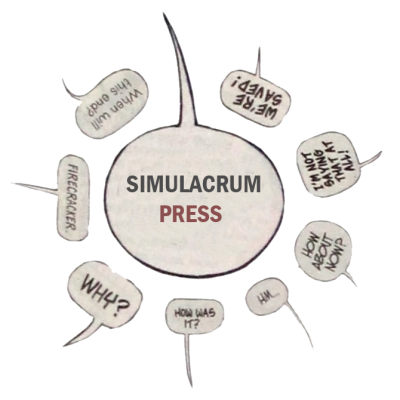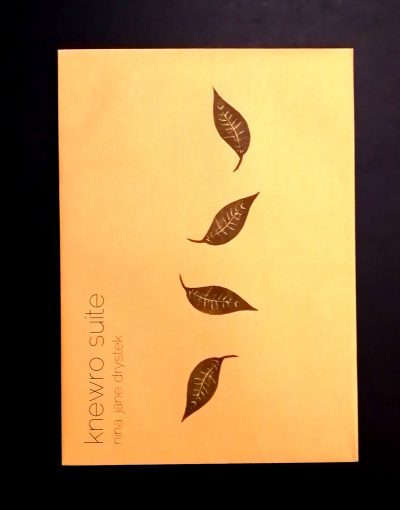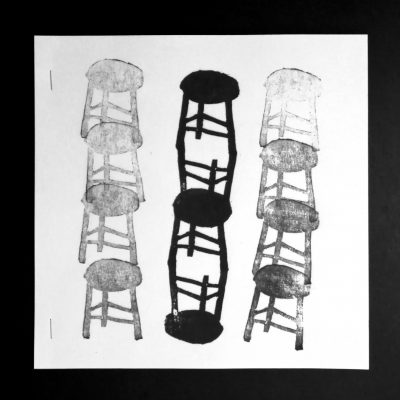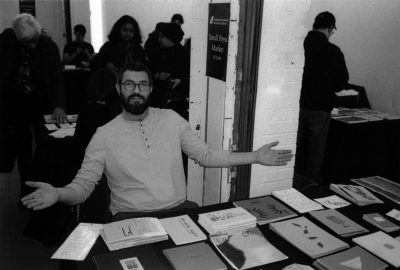
Founder
Sacha Archer lives in Ontario, Canada with his wife and two daughters. He works in a greenhouse tending roses. Archer’s latest book is Mother’s Milk (Timglaset, 2020), a collection of his rubber stamped concrete poetry. His latest chapbooks are Lines of Sight (nOIR:Z, 2020), Houses (no press, 2020) and MODELS [of Economic Recovery] (Simulacrum Press, 2020). Framing Poems (Timglaset) and UMO (The Blasted Tree) are both forthcoming. His concrete poetry has been exhibited in the USA, Italy, and Canada. Find him on Facebook and Instagram @sachaarcher and on Twitter @sachaarchermeat.
Tell us a bit about your press. How did you start? Who are your influences, in Canada and beyond? What is your mission?
I started up Simulacrum Press at the end of 2017 as a place where my poetic experiments and those of others could find a home. I had no experience publishing but I wasn’t looking to be a major publisher or anything, so I figured I might as well give it a try and see how it went.
During my time at university my friends and I would shoot off on Xerox machines what we called then ‘zines’ but I would now call chapbooks. One of those friends was Michael e. Casteels. He and a mutual friend, Andrew Nurse, treated these chapbooks, in an almost imaginary way, as a small press, though at that time I and probably they had no concept of what small press was. On each of their chapbooks one would find Puddles of Sky Press. Fast forward some years later—we had lost touch. I’m in China teaching and in an email from a friend I’m directed to a website. I find that Michael is publishing poets—he’s printing their work, designing covers, layout etc. – and he’s selling these! Puddles of Sky Press – that’s what got me thinking.
Simulacrum Press now exists with a very simple mission: publish great experimental poetry by great poets, new and veteran, from Canada and from anywhere – and produce it well.
What about small press publishing is particularly exciting to you right now?
At this moment there are quite a number of small press publishers that are taking huge risks and doing so joyfully. It is not easy selling experimental poetry, but there is an audience and the fact that we can so easily connect via social media means that the conversation is global and instant. Due to the fact that the community has been enlarged in this way a great amount of astounding work is travelling through the post, through the air, crossing borders and landing in homes around the world. And you don’t find such beautiful works, produced with such love and ingenuity (or extremely rarely,) in your café/bookstore like Chapters or Indigo. Small press is where poetry is actually happening. Small press is the Guggenheim of poetry.
Tell us about three of your publications. What makes them special, needed, and/or unique?
I recently saw the results of a survey ranking the most and least essential jobs. No surprise, ‘Artist’ was ranked as the least essential. There are arguments for and against this, but I will say that I agree and this is what, I believe, is the essence of the arts. The arts are our beyond merely survival. They are our becoming, rather than just our being.
It is, as it should be, difficult to choose three publications out of them all to mention here, so I will go with the most recent, excluding those of which I am the author. Check them out below.
How have the current multiple global crises impacted your work with the press?
Very little. Of course the ongoing pandemic has meant no book fairs and these events are essential for the reader to encounter the works in their tactile form, which is what it’s all about, but that hasn’t stopped me from producing the works and promoting them on social media. A pandemic of this scale is no reason to stop. We have all had to change our ways, but not stop. In regards to the intensification of the Black Lives Matter movement, Simulacrum Press remains open to all voices that work in experimental modes, and that, as long as the press is running, will not change.

knewro suite
nina jane drystek
July 2019
knewro suite by Ottawa based poet nina jane drystek is an austere work of beauty—three carefully controlled sound poetry scores which, on the printed page, serve as concrete poetry that knows its stuff. This comes as no surprise as drystek has, in the past, worked closely with revered small press publisher and poet (concrete, sound and otherwise) jw curry in the sound poetry group Quatuour Gualuour. Recently drystek released a recording of knewro suite performed and it is well worth listening to here.
Also worth noting, drystek is on the shortlist, deservingly, of the RBC Bronwen Wallace Award for Emerging Writers for her poem sequence c:ode.

Found Word from Olivetti
hiromi suzuki
June 2020
Found Words from Olivetti, a selection of Tokyo based poet hiromi suzuki’s typewriter poems hints at narration while remaining ephemeral—tender, though brooding and from the shadows. Formally innovative in that these poems have been photographed to create visual tones beyond that of the typewriter, the reader finds themselves immersed an atmosphere reminiscent of film noir.

Correctional Sonnets
Kyle Flemmer
February 2020
Correctional Sonnets by Calgary based poet Kyle Flemmer explores the form of the sonnet by purely visual means. The sequence reads almost like an erasure poem in that it is composed not with words but instead with various forms of white-out (correctional fluid, pen and tape). The irony, of course, is the initial absence of words—there has been no correction and what has occurred is a re-purposing of mediums: what is intended to silence, speaks.
